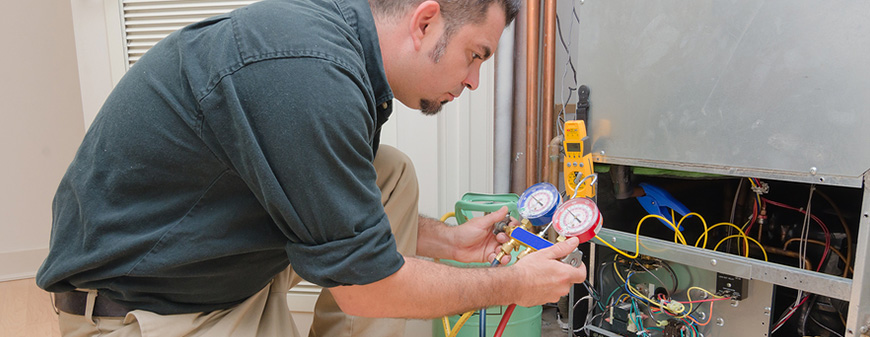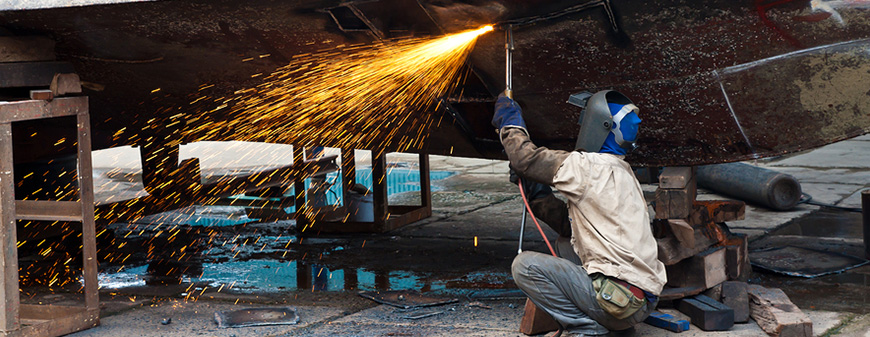
Picking a career in the skilled trades is like picking a career in any other industry: It’s a big decision. You probably (and rightfully) have a lot of questions like these flying through your mind:
- Will there be jobs waiting when I finish school?
- How much will I make?
- Where will I work?
- Will I like the job?
The good news is the government has answers! Check out the latest data from the Bureau of Labor Statistics (BLS) on some of the main skilled trades careers.
HVAC/R Technician

If you’ve ever taking cover indoors from a sizzling hot summer day, you have an HVAC/R technician to thank for making sure the A/C was on. These tradespeople service heating, ventilation, air conditioning and refrigeration equipment that keeps us comfortable through all seasons of the year.[1]
Job Outlook
HVAC/R installation, maintenance and repair is a growing industry. The BLS predicts jobs will be added at a rate of 15 percent through 2026. This is more than twice as fast as the national average of 7 percent for all occupations.[2]
Get Started on the Path to a New Career
Fill out our form to learn how we can help you change your life.
People with an HVAC/R education have the best shot at taking advantage of all that job growth. The equipment that technicians operate is complex, and it’s only getting more complex with new advances. Formal HVAC/R training trains people to effectively work with this equipment and keep up with its evolution.[3]
Location and Schedule
Where do HVAC/R techs work? Pretty much anywhere that needs heating or cooling:
- Homes
- Schools
- Factories
- Stores
- Office buildings
- Hospitals
They can work indoors and outdoors. Some stay at one location all day, and others travel to several places making service calls. Their schedule is usually full-time, and overtime is common during peak service seasons.[4]
Solar Photovoltaic Installer

Renewable energy is a big business these days! More and more people are getting solar panels to save money on their electric bills and help the environment.[5] Solar photovoltaic installers assemble, install and maintain the panels.[6]
Job Outlook
If you’re looking for an industry with a lot of jobs, solar is the way to go. The BLS predicts employment of solar photovoltaic installers will grow at a rate of 105 percent through 2026. That’s 15 times as fast as the national average.[7]
Just because there are a lot of jobs doesn’t mean the market isn’t competitive though. Those who’ve completed a course in photovoltaic systems at a trade school or community college will have the best job prospects.[8]
Electro-mechanical technology programs can prepare you for a job as a solar photovoltaic installer or an HVAC technician.
Location and Schedule
If you love the outdoors, this could be a great career for you. These tradespeople mostly work outside on rooftops and on the ground.[9]
Weather can affect their schedules, but most solar photovoltaic installers work more than 40 hours a week.[10] U.S. News and World Report ranks the stress level for this career as below average.[11]
Electrician

Flipping the lights on wouldn’t be possible without the work of electricians. They install, maintain and repair communications, lighting, electrical power and control systems.[12]
Job Outlook
The BLS predicts that jobs for electricians will be added at a rate about as fast as average (7 percent) through 2016.
Knowing how to handle multiple duties like installing solar panels and repairing electronic systems can improve job opportunities.[13] Many of the skills needed for the job can be learned in an electrician training program, which teaches the right way to operate HVAC/R, solar, and electrical systems.
Location and Schedule
Electricians work in homes, factories, businesses and at construction sites.
It’s active work that can take them indoors or outdoors. Commuting around town or to other cities is common. A full-time work schedule is the norm for electricians—unless they work for themselves, and many do.
Self-employed electricians can have the option of making their own hours. Overtime is typical for construction electricians.[14]
Welder

Take a look around you. The work of welders is everywhere.
Welders make the metal joints used in buildings, bridges and highways.[15] They also take care of the welding in hundreds of types of products like computers, cell phones and medical devices.[16]
Job Outlook for Welders
Similar to electricians, welders should see job growth that is about as fast as average (6 percent). Many welders will play an important role in rebuilding the nation’s infrastructure—a job anyone would feel proud of.
Welders who are skilled in the latest technologies will likely have better job opportunities.[17] The skills integral this trade can be learned in a welding training program.
Location and Schedule
Welding is active work that places workers indoors or outdoors. They typically work in places like these:
- The Manufacturing sector
- The construction industry
- Repair and maintenance shops
- Wholesalers of durable goods
Welding is usually a full-time job. Those who work in manufacturing may work evenings or weekends. Many welders work overtime as well.[18]
Closing the Skilled Trades Labor Gap
You’ve seen the numbers, but why else should you consider a career in the skilled trades?
Well, the skilled trades shortage in the U.S. is a big problem. The country needs welders, electricians and other tradespeople to replace the ones who are currently retiring.[19]
Joining the ranks of these professionals means you help ensure the lights stay on and the country keeps moving.
Want to know more details? Check out the different types of HVAC/R careers.
Additional Sources
[1] https://www.bls.gov/ooh/installation-maintenance-and-repair/heating-air-conditioning-and-refrigeration-mechanics-and-installers.htm
[2] https://www.bls.gov/ooh/installation-maintenance-and-repair/heating-air-conditioning-and-refrigeration-mechanics-and-installers.htm
[3] https://www.bls.gov/ooh/installation-maintenance-and-repair/heating-air-conditioning-and-refrigeration-mechanics-and-installers.htm#tab-4
[4] https://www.bls.gov/ooh/installation-maintenance-and-repair/heating-air-conditioning-and-refrigeration-mechanics-and-installers.htm#tab-3
[5] https://www.bls.gov/ooh/construction-and-extraction/solar-photovoltaic-installers.htm#tab-6
[6] https://www.bls.gov/ooh/construction-and-extraction/solar-photovoltaic-installers.htm#tab-1
[7] https://www.bls.gov/ooh/construction-and-extraction/solar-photovoltaic-installers.htm#tab-1
[8] https://www.bls.gov/ooh/construction-and-extraction/solar-photovoltaic-installers.htm#tab-6
[9] https://www.bls.gov/ooh/construction-and-extraction/solar-photovoltaic-installers.htm#tab-3
[10] http://www.owlguru.com/career/solar-photovoltaic-installers/job-description/
[11] https://money.usnews.com/careers/best-jobs/solar-photovoltaic-installer
[12] https://www.bls.gov/ooh/construction-and-extraction/electricians.htm
[13] https://www.bls.gov/ooh/construction-and-extraction/electricians.htm#tab-6
[14] https://www.bls.gov/ooh/construction-and-extraction/electricians.htm#tab-3
[15] https://www.bls.gov/ooh/production/welders-cutters-solderers-and-brazers.htm#tab-2
[16] http://www.careersinwelding.com/welding_fun_facts.php
[17] https://www.bls.gov/ooh/production/welders-cutters-solderers-and-brazers.htm#tab-6
[18] https://www.bls.gov/ooh/production/welders-cutters-solderers-and-brazers.htm#tab-3
[19] https://www.forbes.com/sites/emsi/2013/03/07/americas-skilled-trades-dilemma-shortages-loom-as-most-in-demand-group-of-workers-ages/#2b1a28686397
This blog has been labeled as archived as it may no longer contain the most up-to-date data. For a list of all current blog posts, please visit our blog homepage at https://www.rsi.edu/blog/

